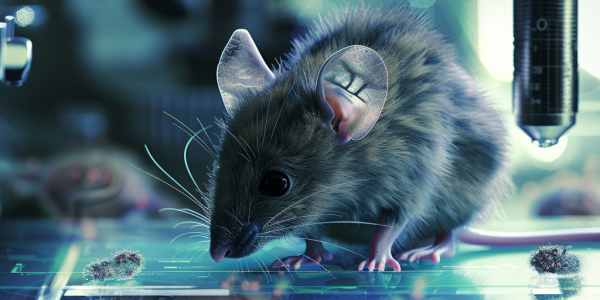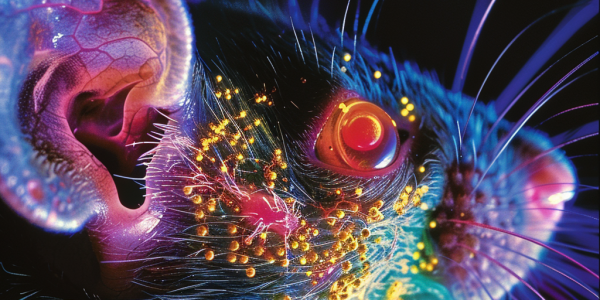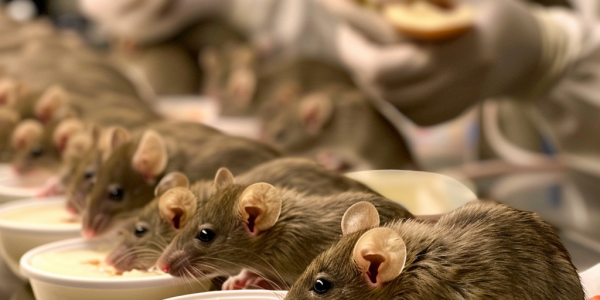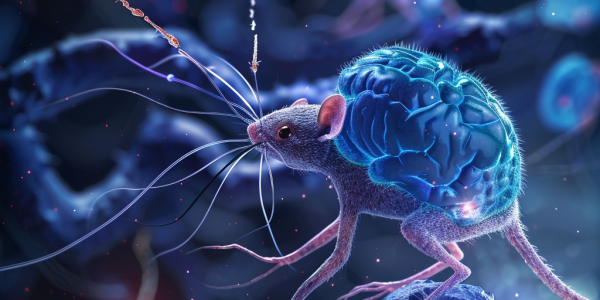Cornell Study Reveals Insights into Muscle Regeneration and Aging
Cornell University engineers have revealed new insights into muscle regeneration and aging, highlighting how immune cell interactions and stem cell states change over time. Their study, published in Nature Aging, identifies critical factors affecting muscle repair in older mice, paving the way for potential therapies to combat age-related muscle degeneration.
Scientists Create Chimeric Mice to Unravel Evolutionary Origins of Pluripotency
Scientists in Hong Kong have created chimeric mice by integrating ancient choanoflagellate genes, revealing insights into animal evolution and pluripotency. This groundbreaking research highlights the genetic continuity between single-celled organisms and complex life forms, potentially transforming our understanding of stem cell development and its applications in regenerative medicine.
Study Reveals Environmental Factors Key to Longevity in Mice
Recent research reveals that mice may live longer not just due to reduced caloric intake but also because of energy balance influenced by environmental factors. A study led by scientists from the University of Alabama and the University of Aberdeen highlights the role of cooler environments in promoting longevity through increased energy expenditure. This groundbreaking finding suggests that understanding the relationship between diet, health, and aging requires a multifaceted approach, paving the way for future dietary guidelines that enhance longevity and overall well-being.
Potential Breakthrough in Extending Mammalian Lifespan through IL-11 Inhibition
Discover the potential breakthrough in extending mammalian healthspan and lifespan through the inhibition of IL-11 signaling. Studies show that deletion of Il11 or Il11ra1 in mice can protect against metabolic decline, multi-morbidity, and frailty in old age. Learn more about the exciting opportunity of anti-IL-11 therapy in early-stage clinical trials for aging pathologies.
Study Achieves Supranormal Hearing in Mice, Shedding Light on Hidden Hearing Loss in Humans
A recent study by Michigan Medicine’s Kresge Hearing Research Institute achieved supranormal hearing in mice, revealing insights into hidden hearing loss causes in humans. By increasing neurotrophin-3 in the inner ear, researchers enhanced auditory processing beyond natural capabilities in young mice. This groundbreaking research could pave the way for improving auditory processing in humans, particularly those with age-related hearing loss.
Breakthrough in Understanding Metabolic Health Using BXD Mouse Population
Researchers at the École Polytechnique Fédérale de Lausanne (EPFL) have developed a metabolic health score (MHS) using a genetically diverse mouse population, BXD, to study metabolic syndrome (MetS). By analyzing key health indicators and identifying genetic regions associated with metabolic health, this study offers valuable insights for understanding the genetic basis of metabolic conditions in humans.
Study Reveals Gut Microbiome’s Role in Age-Related Inflammation
Recent research reveals the potential role of the gut microbiome in age-related inflammation. A study found that transplanting gut microbes from aged mice into young mice increased inflammation, highlighting a link between gut microbiome changes and systemic inflammation in aging individuals. The researchers emphasized the importance of understanding this relationship to combat age-related health issues.
New Hormone-Producing Cell Linked to Monogamous Behavior in Mice
A recent study published in Nature by scientists at Columbia University’s Zuckerman Institute reveals the discovery of a new hormone-producing cell in monogamous mice, shedding light on potential links to nurturing behavior and monogamy. The unique adrenal cell type produces 20⍺-OHP, enhancing nurturing behavior in mice and offering insights into human parental behavior and postpartum depression treatments. This groundbreaking research compares the mating behaviors of deer mice and oldfield mice, highlighting the role of hormones in shaping behavior and providing valuable insights into the mechanisms underlying monogamy.
Study Shows Potential of Cross-Species Hybrid Brain Transfers in Restoring Sensory Function
A groundbreaking study led by researchers at Columbia University’s Irving Medical Center has demonstrated the remarkable potential of cross-species hybrid brain transfers in restoring sensory function. By incorporating rat stem cells into a developing mouse embryo, scientists were able to create a ‘hybrid brain’ capable of rescuing the mouse’s sense of smell when impaired. This innovative approach holds significant promise for regenerative medicine, particularly in the realm of restoring neural function in damaged or degenerating brains. Professor Kristin Baldwin highlighted the importance of this research in expanding our understanding of neural circuitry flexibility and the potential applications of such hybrid brains in diverse scenarios, including human-machine interfaces and stem cell transplants.
JAX Researchers Develop Platform to Study Genetic Diversity in Mutation Outcomes
JAX researchers at The Jackson Laboratory have developed a powerful platform using stem cells from eight different mouse strains to mimic genetic diversity, providing new opportunities for uncovering targets for therapeutic interventions. The platform allows for investigating the effects of background genetics on the DYRK1A gene, associated with autism, microcephaly, and intellectual disability in humans. This work has significant implications for understanding the role of genetic diversity in human health conditions and for identifying potential targets for therapeutic intervention.










